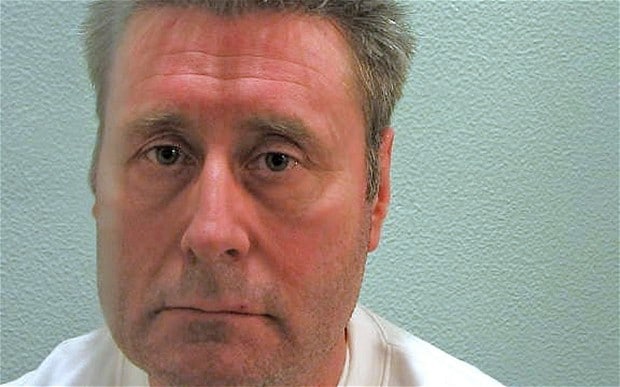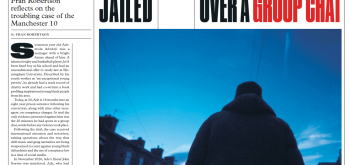Nick Hardwick interview: ‘If you don’t like the heat…’
The sacked chair of the Parole Board has said the Justice Secretary got rid of him to save his own position following the controversy over the John Worboys affair.
In a wide-ranging interview, Professor Nick Hardwick spoke to Hardeep Matharu saying that he welcomed the judicial review of the Parole Board’s decision to release the black cab rapist, but disagreed with Justice Secretary’s handling of the situation.
- This article was first published on Byline. Support Hardeep’s criminal justice column for the website here and follow her on Twitter @Hardeep_Matharu
- This weekend the justice secretary David Gauke revealed reforms to introduce greater transparency in parole board hearings – as reported on the Justice Gap here
When the High Court ruled last month that Worboys would remain in prison while his release was reconsidered by another Parole Board panel, Prof Hardwick was told he had to resign. ‘If you don’t like the heat, don’t go into the kitchen,’ he said, when I asked how it felt to be pushed while being told to jump. ‘I imagined a scenario like this. I thought it would be after we released somebody who committed a serious further offence.
‘I think the Justice Secretary thought his position might become untenable and the way to avoid that was to get rid of me. I don’t think it’s the right decision, but that’s how politicians are.’
The Parole Board is an independent body that decides whether a prisoner is safe to be released once they have served the ‘minimum tariff’ of their sentence. Its decision to release Worboys after nine years in custody was met with public concern and outrage when announced in January.
‘I didn’t have a problem with the judicial review taking place, particularly for a very difficult and controversial decision,’ the professor of criminology at Royal Holloway, University of London, said.
‘I don’t think it’s a bad thing that a second panel will now have to look at the case.’
***
 John Worboys was sentenced in 2009 for committing rape, four sexual assaults, an attempted sexual assault, an assault by penetration and 12 counts of administering a substance with intent against 12 victims, aged 19 to 33, between 2006 and 2008. All of the women he violated had been in his black cab for a ride home.
John Worboys was sentenced in 2009 for committing rape, four sexual assaults, an attempted sexual assault, an assault by penetration and 12 counts of administering a substance with intent against 12 victims, aged 19 to 33, between 2006 and 2008. All of the women he violated had been in his black cab for a ride home.
Despite only being convicted on these 19 counts, it is believed that Worboys actually committed more than 100 rapes and sexual assaults on women in his taxi.
The former stripper and porn actor was given a now-abolished sentence of ‘Imprisonment for Public Protection’ (IPP) for 16 years and became eligible to be considered for release once he had served half of this, last year.
Prof Hardwick believes his axing from the Parole Board – an organisation he had already advocated needed to become more transparent before the Worboys case – was calculated realpolitik by the Justice Secretary, who had mounted no judicial review of the decision to release Worboys himself.
As the only parties involved in a Parole Board hearing are a prisoner and the Justice Secretary, this was the first time a judicial review had ever been brought by anyone who was not a party to the original proceedings.
While the London Mayor Sadiq Khan and News Group Newspapers also challenged the decision, two of Worboys’ victims were the only ones who succeeded and were considered to have grounds or ‘standing’ to make the challenge.
‘David Gauke didn’t think my position was untenable, he thought his position might be untenable,’ Prof Hardwick said. ‘David Gauke thought “I’m going to get hammered for this because I didn’t pursue the judicial review”. If we had challenged the victims’ standing, which we didn’t, but if we had, the judicial review would have fallen and Worboys would have been released. The fact the Secretary of State didn’t exercise the powers that only he had would rightly have led him to a lot of criticism.’
Prof Hardwick said he understands people’s concerns around Worboys. The 60-year-old, who asked his victims to have a drink with him after lying to them that he had won the lottery, had previously been recognised by professionals as a manipulative character who ‘managed impressions’. He denied the crimes he was convicted of until nine months before he became eligible to considered for release. He also denied he had committed any other alleged offences, despite admitting to paying compensation to women who had brought civil claims against him.
When he did eventually admit to his convictions, he maintained that the trigger for his behaviour had been the breakdown of his relationship. But, many of his other alleged offences predated this.
***
Prof Hardwick said both the Parole Board and the Ministry of Justice had been mistaken in believing that Worboys’ other alleged offences could not be taken into account when deciding whether he should be released. The judicial review found that the Parole Board should have looked into Worboys’ wider offending and ‘the extent to which the limited way in which he described his offending may undermine his overall credibility and reliability’.
While the dossier of evidence provided by the MoJ to the Parole Board did reference at least 80 other potential victims, it did not provide any details on these alleged offences. Crucially, details of the successful civil claims brought by some of Worboys’ victims against the Met Police for failing to properly investigate their allegations against him were also not included – despite Justice Green’s ruling in the 2014 case that Worboys had committed more than 105 rapes and sexual assaults on women in his taxi.
No mention was also made in the dossier of Worboys’ grotesque ‘rape kit’, which was found in his car containing small bottles of champagne, gloves, a torch, condoms, plastic cups, a vibrator and Nytol tablets. Despite the lack of details, the High Court said the Parole Board should have made further inquiries into these matters.
‘The mistake was made by the Ministry of Justice,’ Prof Hardwick said. ‘I find it very difficult to see what the panel members could have reasonably done differently with the information they were presented with. The errors by the Ministry of Justice were made by people acting on behalf of the Secretary of State. He could have dealt with it differently.’
The academic said he does not believe that the result of the second Parole Board hearing into Worboys’ case will be ‘a foregone conclusion at all’, and that while a decision to release him would now be ‘brave’, it is likely that he could be moved to an open prison.
***
For Prof Hardwick, one of the key questions raised by the Worboys case is ‘how does a focus simply on risk deal with the public’s wider, reasonable view of justice?’ ‘If you look at the original furore at the decision, the argument was that Worboys simply hadn’t been punished enough for what he had done,’ he said. ‘The Parole Board’s statutory duty is to function entirely on risk. The first thing you have to consider is whether that is enough.
‘For instance, if you were releasing somebody and their behaviour in prison had been poor and they weren’t admitting the entirety of their offence – as in some cases when people refuse to say where the body is – and this is causing a lot of distress to families, that doesn’t necessarily go to their risk after release.
‘If you’re making a decision purely on risk you might say that it doesn’t affect or substantially affect it and we’ll release him. For a lot of people that would seem unjust and that actually your behaviour in prison, your attitude towards your offence and the genuineness of your remorse, ought to affect the decision on whether you are released or not, regardless of whether it’s relevant to your risk.
‘The punishment part of the sentence for the offence should be the tariff that is set by the judge at the time, but it’s reasonable for the Parole Board to take into account what’s happened post-sentence.
‘Maybe Worboys’ attitude towards his offences, the extent to which he was prepared to show genuine remorse and admit his offences should have influenced the decision. At the moment it’s just about risk.’ The former Chief Inspector of Prisons said people also needed to ask ‘how three forensic psychologists agreed he was safe to release’.
‘Three people, without consulting each other, independently, came to a decision that he was safe to release. Are you saying the three forensic psychologists simply made errors or are you saying there’s something fundamentally wrong with the theoretical basis on which they work?’
‘The view [voiced in the media and on social media] that these ‘silly female psychologists’ were all hoodwinked by Worboys and if only you’d had a retired, white, elderly, male judge he would have seen through it, I think is a bit of a flawed assumption,’ he added.
Referring to an article by two of the psychologists published in The Psychologist, Prof Hardwick said much of the evidence around assessing risk is ‘counter-intuitive’, which makes having a sensible public discussion around the issue difficult. ‘The fact that somebody minimises their offence is often an indication that they’re ashamed of what they’ve done and is, in fact, an indicator their risk is low. Statistically, deniers and the shame that goes with that is a protective factor.
‘There is a lot of evidence that people who do this spree offending, statistically, once they’ve been caught, they stop at that point. They don’t repeat.’
Along with psychological assessments and consideration of any rehabilitative programmes completed while in prison, offenders’ ‘static’ and ‘dynamic’ risk factors are measured.
Static are those factors that cannot be changed, for example the nature of an individual’s offences or their experiences in childhood. Dynamic factors focus on that which can change, such as social networks or substance misuse issues. Large data-sets based on these factors are compiled and then used to predict an individual’s likelihood of committing future offences.
‘There are some big questions potentially about the over-reliance on forensic psychology and statistical risk models,’ Prof Hardwick said.
‘I’ve had people say to me that the best way to make a decision would be simply to run the data through a computer and a lot of forensic psychologists would say that, what appears to be common sense – the idea that you get an accurate decision by sitting down and talking to someone – is not true because all your prejudices will come into that and a better way to make a decision is to feed someone’s data into a computer.
‘I don’t agree and this is a good example of why that wouldn’t work. I don’t think that provides the complete answer. I think there may well have been other issues about Worboys’ behaviour, post-sentence, while he was in prison, that may have had some bearing on the judgement on whether to release him. All of this is distinct from the issue that it’s not the Parole Board’s job to punish people for the original offence,’ he added.
***
Considering the practical and ethical complexities involved in determining the future risk of human beings who have committed crimes, the Parole Board’s serious further offences rate for the past four years has been less than one per cent.
A danger for the Parole Board, post-Worboys, is that it will become more risk-averse, Prof Hardwick said.
‘The Worboys case has come at a time when you also have concerns about knife crime and police cuts. Crime has gone up the agenda and I think that will create pressure on the Parole Board. Not so much that the release rate changes, but there will be a lot more deferrals because they’ll feel the decision needs to be absolutely watertight and they’ve got to cover every single base. It will take longer to resolve cases and I think the backlog we successfully got rid of will come back.’
He also said he does not think there is ‘any prospect of legislative reform, not now’ for those inmates still serving the abolished IPP sentences.
But the Parole Board must change.
Prof Hardwick said that, although considerations such as people feeling able to speak freely and the danger of revictimisation must be taken into account, the Parole Board’s hearings should be open to the public and upcoming hearings and results listed online, with the option provided for victims to indicate that they would like to be kept informed. Explanations for decisions and the evidence assessed in each case should also be provided.
The former chair of the Independent Police Complaints Commission said there is a ‘danger that the informality of the process becomes too casual’ and believes the organisation would work better as a tribunal-like body, with powers to summon witnesses and evidence and protection and tenure for members, akin to that provided to magistrates – so that they could not be sacked by a Justice Secretary who disagrees with them when they make an unpopular decision…
***
What are some of the wider issues raised by the Worboys case? ‘When you talk about prison reform without talking about the seriousness of some of the offences people commit or their impact on victims, that means when we’re confronted by a very serious individual case, which to some extent is then having a very direct impact on policy, there isn’t a narrative that enables us to deal with it – that enables us to reflect the seriousness of the offence, but also to intervene in the debate and say ‘I don’t think the answer to this is locking more and more people up for longer and longer’, which unless we’re careful will be the result,’ Prof Hardwick said.
‘I think we need a narrative that doesn’t dismiss people’s concerns about crime or dismiss the harm that even minor crime can do, but, on the other hand, I don’t think the answer simply should be to lock people up for longer. I think we make a mistake by saying the only way we can nowadays reflect society’s condemnation of particular forms of behaviour is by the length of a prison sentence.
‘So, with the parole reforms, I think it is a legitimate question that, in the interests of justice, should the way parole works more reflect people’s concerns? Is trying to make it a pseudo-scientific process of simply looking at risk algorithms getting in the way of justice?
‘One of the problems about personalising it, in the way that sacking me did, is that these broader issues aren’t talked about. It becomes a one-off political interesting squabble.
‘I’m not afraid to talk about punishment but it’s the classic thing that your punishment is going to prison, not being in prison and from that point we will try to rehabilitate. The issue is not simply what stops offenders committing crimes, but what stops people becoming offenders.
‘I think a lot more people would be up for reasonable discussion on this and that’s what we should do and I think the Worboys case raises quite profound issues.
‘I think the people who said it was the wrong decision to release him for various reasons had quite a reasonable point of view. I could also understand why the panel did what they did. The view I disagree with most strongly are the people who say, one way or another, it’s all simple. I don’t think it was simple and I think there’s some quite profound and philosophical and ethical issues in it.’
A version of this article first ran on Byline on April 27, 2018







A detailed critique of the Court of Appeal judgment in the case of Oliver Campbell